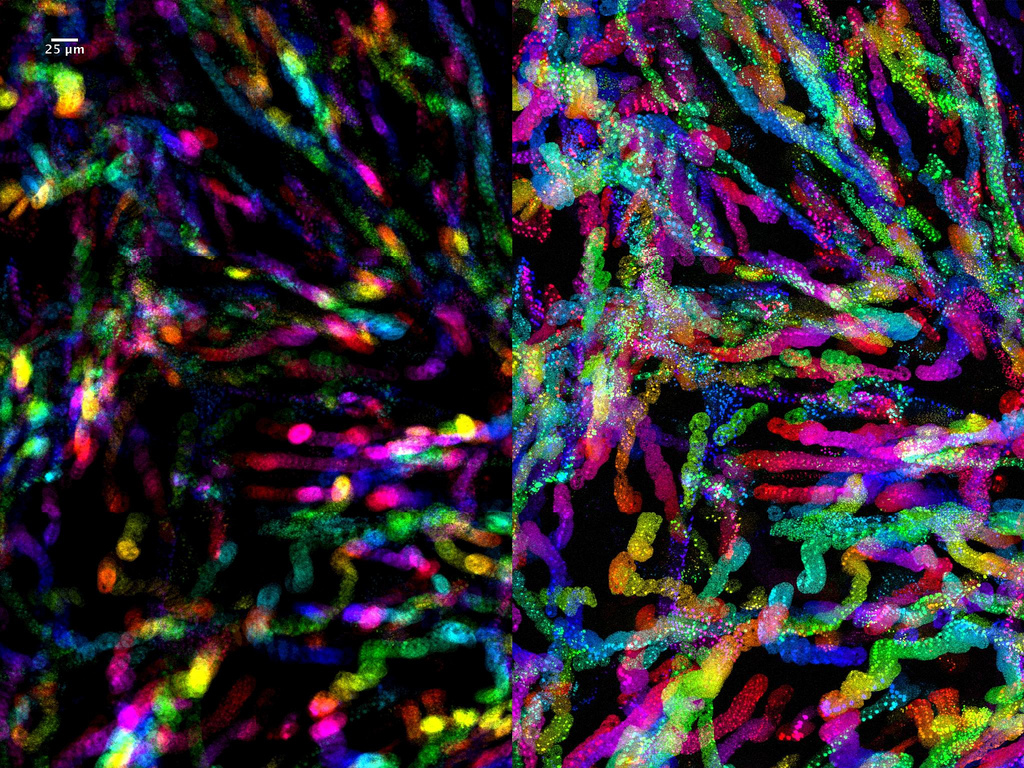We’ve all heard the age-old saying, “you are what you eat”. But is there really any evidence behind this?
It turns out there is.
Dr Nathan O’Callaghan and his team of nutritional experts from our Food, Health and Life Sciences group is helping to reduce our risk of developing chronic diseases like diabetes and obesity through the food we eat.

Nutritional expert and devoted family man, Nathan O’Callaghan and his two little monsters.
After studying genetics at the University of Adelaide and the Australian National University, Nathan joined us as a post-doctoral fellow in nutritional genomics. Today he leads our team of obesity and metabolic health experts, helping Aussies manage and avoid obesity and its related health effects.
In particular, Nathan is looking at how food and food components interact with our cells, tissues and organs to impact our health.
“The information we can collect is quite amazing – from exquisite details of molecules sitting on top of our DNA, to what the entire Australian population is eating! The challenge is to use what we know to help people optimise their health,” says Nathan.
He is measuring the amounts of particular molecules in people’s bodies to create a ‘picture’ of the way they are functioning. This can help experts determine how certain foods, diets and lifestyle programs might influence our wellbeing. They can do this through a blood test, saliva sample, urine sample and now even a breath test.

An example of DNA damage within a live cell. Image: Glyn Nelson.
The data he collects can also tell us which types of nutrients can help improve our health. In fact, research shows that changing your eating patterns can affect your DNA or genome in just two weeks.
So this raises the question, how can we eat our way to healthier DNA?
Nathan suggests eating a diet high in fibre, fruits and vegetables, with some fish and vitamins can improve our genome and cellular health. Oily fish like salmon and tuna contain high levels of omega 3 fats which can help prevent heart disease.
On the other hand, eating too much processed meat and drinking too much alcohol can actually damage your DNA, age your cells and increase your risk of serious diseases like bowel cancer.
Nathan’s adorable little snow bunnies, Tilly (left) and Alfie (right).
But it’s not all genes and cells for Nathan. Back in 2011 he was a contestant in the very first series of I’m a scientist, get me out of here – an online Australian Idol-style science contest where students vote for the scientists they find the most interesting. Nathan proved to be one of Australia’s most popular scientists, with the highest-ranking overall score for South Australia.
“It was great to be part of the program. I want to inspire the next generation of scientists and give students who are studying science the opportunity to see what we do and how we do it.”
He’s also a devoted family man and loves to travel with his two kids, Tilly (age 7) and Alfie (age 3). He even took them on a recent work trip to Canada where he was investigating how nutrition during pregnancy affects health trajectory in babies. Now that’s multitasking.
Nathan tweets as @nath_oc.
For more information on careers at CSIRO, follow us on LinkedIn.



23rd October 2014 at 1:15 pm
I live in South Africa but would love to be included in your future research! Helene Potgieter
7th March 2014 at 10:26 am
Hi Nathan
What inroads have you made with regards to effects of sugars, including fructose in our diets. Hearing, reading that some sugars when entering our system are like poison, to be avoided, some even saying that cancer cells feed off sugars. Would like to know what you have researched in this area
Regards Magda
Love the pic’s of the boys – I had 3 sons, very blessed.
21st March 2014 at 8:51 am
Hi Magda,
Nathan hasn’t done a lot of research in this area, but here’s what he has to say about the issue:
Sugar is a simple type of carbohydrate that is used as an energy source by all cells in the body. Most experts recommend limiting ‘sometimes’ foods that are high in sugar such as sugar sweetened soft drinks, sports drinks, cordials, confectionery, sweet biscuits and cakes, etc.
The Heart Foundation suggests rather than making choices based on sugar content alone, see what else a food offers nutritionally. Look for high fibre and calcium and foods low in saturated fat and sodium. More info here:
http://www.heartfoundation.org.au/healthy-eating/food-and-nutrition-facts/Pages/carbohydrate-sugars.aspx
The WHO has also just made recommendations that sugar should stay at below 10% of total calorie intake a day, with 5% the target.
Everything is a poison, just depends on the dose!
Cheers,
Steph (on behalf of Nathan)
18th February 2014 at 11:05 am
How much is too much? My wife and I tend to drink alcohol with food, as do the French. Our usual rule is a glass with lunch and a glass before and a glass with dinner. When friends visit outside eating times, we might have an extra glass or two each, but this is infrequent. We are aware of the dangers of excessive alcohol as we live in a semi-rural seaside area where the pubs overspill with tradies and holidaymakers.
What do you mean by processed food? We mainly eat meat and fish purchased raw and cooked at home, but I like the odd slice of Mortadella for my lunch. We stay away from McDonalds and KFC.
Incidentally, I have just hit the big 80, if that is relevant.
18th February 2014 at 2:58 pm
Hi Jim. See Nathan’s response below:
Great question – How much is too much?
For alcohol consumption I refer to the NH&MRC Guidleines: For healthy men and women, drinking no more than two standard drinks on any day reduces the lifetime risk of harm from alcohol-related disease or injury. And For healthy men and women, drinking no more than four standard drinks on a single occasion reduces the risk of alcohol-related injury arising from that occasion.
As for processed meat – there are slight variations depending on the diseases you wish reduce your risk of. World Cancer Research Fund in their 2007 report, recommend avoiding processed meat, while the Heart Foundation recommends limiting processed meat and our own Total Wellbeing Diet encourages eating a wide variety of food types – in the right proportions. However, the diet should be combined with regular exercise to truly achieve total wellbeing.
Congratulations on celebrating your 80th circle around the sun.
Cheers,
Nathan